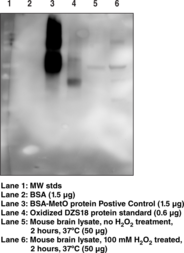Territorial Availability: Available through Bertin Technologies only in France
- Correlated keywords
- proteins sulfoxides oxidative modifications residues MSRs reactive oxygen species ROSs methionines oxidations reductases sulfones phagocytosis phagocytotic mitochondrias mitochondrial respirations sulfoxidations age-related diseases cellular cells IgG-containing sera Alzheimer’s diseases immunoblots immunoblotting western blots blotting kits assays measures measurements detection tissues lysates semi-pure purified reducing non-reducing sample buffers SDS-PAGE rabbit serums immunizations oxidized corn MetO-DZS18
- Product Overview:
Protein methionine sulfoxide (MetO) is a reversible oxidative modification that occurs by exposure of protein(s) methionine residues to reactive oxygen species (ROS).{16659,17215} Methionine oxidation can alter the function(s) of the modified proteins and if not reversed by MetO reductases can be further oxidized to methionine sulfone, an irreversible modification.{17640} Methionine oxidation may occur as a by-product of phagocytotic oxidative bursts, normal mitochondrial respiration and may also occur from environmental chemical exposures.{16659,12948,16650} The overabundance of methionine sulfoxidation is implicated in age-related diseases.{12948} Cellular protein MetO levels may be influenced by the decrease or loss of methionine sulfoxide reductase (MSR) activity or by an overabundance of ROS leading to increased levels of dysfunctional proteins.{16650,17641} The Methionine Sulfoxide Polyclonal Antibody provided in this assay kit detected IgG-containing MetO from sera of Alzheimer’s patients but not from normal control sera.{17215} Cayman’s MetO Immunoblotting Kit contains reagents needed for the immunochemical detection of proteins containing MetO residues by western blotting. MetO-containing samples of interest include those from cell or tissue lysates as well as semi-pure or purified proteins. Samples may be prepared with reducing or non-reducing sample buffer prior to SDS-PAGE and tested along side one SDS-PAGE well designated for the provided positive control. The MetO Polyclonal Antibody was isolated from rabbit serum generated after immunization with a oxidized corn protein (MetO-DZS18) rich in methionine.{17215} This polyclonal antibody is specific for protein methionine sulfoxide.
Cayman Chemical’s mission is to help make research possible by supplying scientists worldwide with the basic research tools necessary for advancing human and animal health. Our utmost commitment to healthcare researchers is to offer the highest quality products with an affordable pricing policy.
Our scientists are experts in the synthesis, purification, and characterization of biochemicals ranging from small drug-like heterocycles to complex biolipids, fatty acids, and many others. We are also highly skilled in all aspects of assay and antibody development, protein expression, crystallization, and structure determination.
Over the past thirty years, Cayman developed a deep knowledge base in lipid biochemistry, including research involving the arachidonic acid cascade, inositol phosphates, and cannabinoids. This knowledge enabled the production of reagents of exceptional quality for cancer, oxidative injury, epigenetics, neuroscience, inflammation, metabolism, and many additional lines of research.
Our organic and analytical chemists specialize in the rapid development of manufacturing processes and analytical methods to carry out clinical and commercial GMP-API production. Pre-clinical drug discovery efforts are currently underway in the areas of bone restoration and repair, muscular dystrophy, oncology, and inflammation. A separate group of Ph.D.-level scientists are dedicated to offering Hit-to-Lead Discovery and Profiling Services for epigenetic targets. Our knowledgeable chemists can be contracted to perform complete sample analysis for analytes measured by the majority of our assays. We also offer a wide range of analytical services using LC-MS/MS, HPLC, GC, and many other techniques.
Accreditations
ISO/IEC 17025:2005
ISO Guide 34:2009
Cayman is a leader in the field of emerging drugs of abuse, providing high-purity Schedule I-V Controlled Substances to federally-licensed laboratories and qualified academic research institutions for forensic analyses. We are certified by ACLASS Accreditation Services with dual accreditation to ISO/IEC 17025:2005 and ISO Guide 34:2009.





